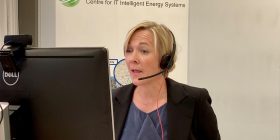Henrik Madsen has been interviewed by Digital Hub Denmark about the research in CITIES Innovation Center, FED, Smart Cities Accelerator and other CITIES related projects, working with energy optimization, flexibility etc. as ways to green transition.
Digital Hub Denmark writes, that researchers at DTU Compute are investigating ways of managing the energy systems of the future based on green, fluctuating sources of energy. The Danish government’s new plan to introduce a CO2 tax could turn seven years of research into reality.
“We’ve been used to regulating the demand for energy at the power plants, but we can’t do that with green energy sources that fluctuate with the weather. So, the entire energy system needs to be turned upside down. In future, the flexibility needs to be in the energy system itself and at the consumer end,” Henrik Madsen says.
Read the article here: https://towardsno1.dk/denmark-to-become-a-laboratory-for-advanced-digital-management-of-green-energy/




